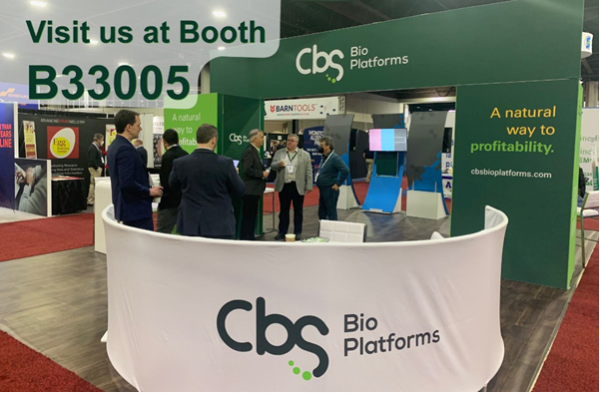
At a time when animal agriculture faces unprecedented demand to produce more with less use of resources, new advances in feed technology are helping to provide practical solutions that producers can count on.
A number of top examples are highlighted this week at the 2024 International Production & Processing Expo (IPPE), Jan. 30 – Feb. 1 in Atlanta.
“Finding new ways to get more out of production while at the same time conserving resources has arguably never been more important, “ says Paul Garvey, Canadian Sales Manager with CBS Bio Platforms. “This is critical not only to maximize efficiency and profitability, but also to meet rising marketplace demands.”
The good news is that new advances in feed science have emerged to help producers meet this challenge and stay ahead of the innovation curve, he says. Among the CBS Bio Platforms portfolio, this includes key developments with Biocatalyst Technology as well as with Yeast Bioactives Technology.
Enzymes: ‘the original nutrient-sparing technology’
The CBS Biocatalyst Technology platform centers on enzymes technology, which helps producers get more nutritional value and other benefits from feed. Enzymes accomplish this by breaking down feed components into more digestible form, thereby increasing nutrient availability to the animal while simultaneously reducing waste.
“Enzymes applied to animal feed are one of the original nutrient-sparing technologies,” observes Garvey. “As enzyme technology has improved over the years, so too has the level of benefit, giving us an excellent story to tell about resource stewardship in agriculture.”
A standout Biocatalyst Technology enzyme solution now becoming widely available across production regions, and showcased at IPPE 2024, is new ‘multi-protease’ technology. This protein-sparing technology, available in product form as ProSparity for poultry and swine production, is designed to increase nutrient availability from protein sources while simultaneously reducing resource use.
“This multi-protease technology was designed for synergy, where the different types of protease included all complement one another to result in a much higher level of feed breakdown than traditional protease options,” says Will Varner, USA Business Development Manager with CBS.
“This technology allows producers to achieve a higher level of nutritional utilization from the same amount of feed, which adds efficiency and reduces costs. It also allows for better nutritional utilization from alternative or less commonly used protein sources. Further, it reduces the need for synthetic amino acids, which is beneficial due to cost and overall availability challenges related to supply chain reliability. All of this gives producers more options to help with cost control.”
Yeast options for performance, health management
Progress with CBS Yeast Bioactives technology has also shown advantages to get more out of feed, by not only supporting efficiency and performance but also health management. Maxi-Nutrio®, including Maxi-Nutrio Liquid, is a top product utilizing this technology.
“Health challenges can drain efficiency and undermine profitability,” notes Sabrina Zettell, Canadian Technical Manager with CBS Bio Platforms. “The Yeast Bioactives technology provides a valuable safeguard. We’re finding that more customers are using it proactively to help keep animals healthy and productive. This supports efficient use of resources in many ways, including through feed efficiency and also supporting antimicrobial stewardship by lessening the need for antimicrobial intervention.”
New results with Yeast Bioactives Technology and this product line are featured in a Tech Talk at IPPE 2024, presented by Zettell, titled “Improving GIT Development & Reducing Pathogenic Bacteria Load in Broiler Chickens.” (IPPE participants can attend Weds, Jan, 31 at 11:30 a.m. in B Hall, Booth B48027.)
More information on CBS Bio Platforms is available at www.cbsbioplatforms.com and additional insights on FSPS are available at fsp.cbsbioplatforms.com.







